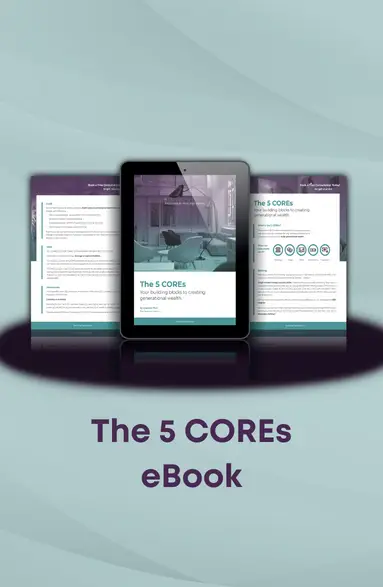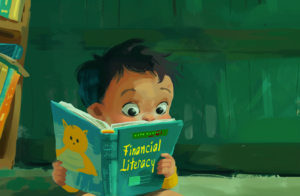I used to think money was the root of ALL evil. But who hasn’t at one point or another?
When it comes to money, we talk about numbers, strategy, the mindset, but very little is focused on our relationship with money. In fact, most people don’t even know they have one (whether it’s good for bad).
During my younger years, I was an idealist. I wished for a better world. I truly believed there could be win-win situations for ALL and that people were mostly innocent. Oh, and I believe money could solve ALL the problems in the world.
… Boy, was I in for a surprise.
After life knocked me back down once or twice, I realized, money was evil. Money was what caused my parents to fight and ultimately divorce. Money was why I was made fun of at school with my Chinese food and clothing. Money was the reason why I was so sad and felt alone all the time because my parents couldn’t be with me.
Truth is, I know I’m not alone in feeling this way, but there was a deeper truth. Money wasn’t the issue. Money was only the surface issue we seem to attach ourselves to because it’s easier than going deeper.
My mother long fell out of love with my dad.
I was made fun of because kids ARE mean and they didn’t understand my culture, nor wanted to.
I felt sad and alone because I didn’t know HOW to ask my parents for more time and support to be with me.
Money had nothing to do with ANY of my problems because money isn’t evil or a culprit.
Money is simply a tool – one that you can wield either in your power or against you.
1. Assess where you are without judgment or shame

If you’ve ever worked with a financial advisor, you’ll know that the first thing they do is take a look at your whole financial situation to get a sense of where you are, what assets you’re holding, the amount of debt you have, and how much savings you have. The reason for this is because they’re trying to assess to see where they can help. They are gathering financial intelligence before making you a recommendation.
Financial intelligence is about knowing your numbers, what they mean, and how to interpret that information. Part of financial intelligence is gathering information about your financial state, and then being able to draw conclusions based on that information.
This is something I believe that everyone should do regardless of whether they’re working with a financial advisor or not, because if you don’t know where you’re at right now in terms of the exact dollar figure, it’s very hard to get clear on where you want to go and set goals accordingly.
So where do you start?
The reason that most people DON’T do this isn’t because they don’t want to, it’s simply because they don’t know HOW to do this for themselves. Financial advisors often do because they have something called financial literacy. And you can too – read on.
2. Understand the three components of financial literacy
In the age of information overwhelm, I believe the 3 main components when it comes to financial literacy are this:
- Understand the value of a dollar and WHY we have our money system
- How to earn, invest, and protect your capital
- Discover or build your relationship with money
These are my core beliefs because, in order for you to have a clear understanding of anything, you first have to understand its history. Understanding the value of a dollar is going back to the federal reserves, trading, but more importantly, our money system. Seek first to understand WHY we even have a system in place as this will give you a full picture of the puzzle.
Next, learning the logistics or “the trade”, which is how to earn, invest, and protect your hard earned capital. These are the tools you’ll be using to play the game.
Finally, the most important one of all is your relationship with money. I’ve said it earlier – money is simply a tool you can wield. This is important because it will gravely affect how you use your tools of the trade. It can either help or harm you. Remember, money has no emotions – that’s on you as the human to mitigate.
3. Establish your money goals

My students often think of money goals as “paying off debt” or “retire young” and “become a millionaire”.
These may seem like goals at first but, once you break them down, they’re more like hopes and dreams because they’re “nice to haves” but there’s nothing tangible or measurable about these statements – therefore, they’re hopes and not goals.
Goals are plans that you make, with certain actions that have to be taken by a specific time and includes something that you can measure. I use SMART goals as my own personal framework and the one I teach in our SVC Wealth Program.
SMART Goals = Specific, Measurable, Attainable, Realistic, Timely.
So if your goal is to “pay off debt” these are some of the questions I would ask:
- What type of debt is it?
- How much is the total amount of debt?
- What is the interest rate of this debt?
- When do you want to pay this debt? (Include the year/date/month and time!)
- Is it realistic for me to do so WITHOUT setting back my own financial situation?
- How can I measure if I’m successful?
Once I have all those questions answered, I can then proceed to set my goal. Let me show you the difference.
Original Goal: I want to pay off debt.
SMART Goal: I’m going to reduce my credit card balance to under 30% utilization by December 30th of 2021 by paying $300/month starting January 20th, 2021.
I am now clear that I’m focusing on credit card debt, and my goal is to get it under 30% utilization (PS – 30% is all you need to maintain to continue building your credit). The way I’m going to measure this is to see how much I’m putting towards my credit card monthly (the objective is $300/month) with the end date of December 30th of 2021.
Now this gives me a clear direction on how to tackle my goal and, because I’ve set a timeline, it’ll help me build a better roadmap of the actions I need to take in order to hit my target.
Start healing your relationship with money
Sometimes the relationship with money starts with releasing our previous belief patterns but mostly, it’s becoming financially literate. See, the more you learn about money, it’s history, and how to wield it vs being a byproduct, the more you’ll see money in a new light.
Only then can you create that bestie relationship with your money.
My parting words for you are, seek to first understand and then be heard. You might have had similar shitty experiences with money, terrible even, but don’t let that deter you from building a healthy one in your future.
Because if money is evil, who the hell would want more if it, right?







